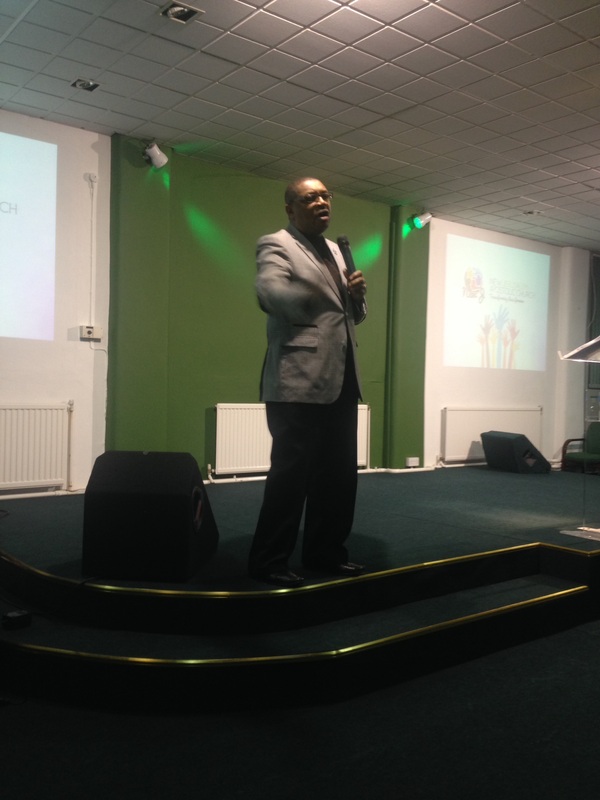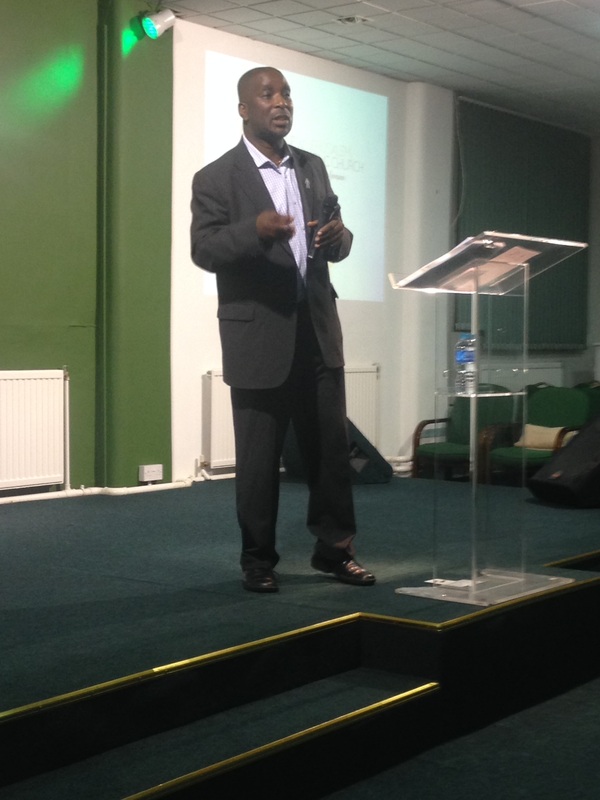(Above Bishop Melvin Brookes of New Jerusalem Church and Winston Mosquito sharing their Journey having to deal with Prostate Cancer)
The launch of our regular Mens Health Awareness event has now taken place.
Many will ask why incorporate Blood Pressure and Diabetes on the same agenda as Prostate cancer. it is simple their all affect African and Caribbean men in devastating ways and need to to equally on all agendas and health checks a man may take.
The myth and issues that men face in taking control of their health needs to be dealt with, before its too late.
We do have a Birmingham Prostate Cancer Steering Group looking at how to deal with the health inequality affecting the African & Caribbean Community, as unlike the national average of 1:8 men getting prostate cancer, 1:4 African Caribbean men will get Prostate Cancer and 1:5 will die from it.
There are various early intervention treatments available, if it is caught early.
As Bishop Brookes made one comment " There is a difference between being cool and being cold" and whilst Winston Mosquito shared his journey having being diagnosed February this year, despite not having any visible symptoms, he commented on the " lack of support for African & Caribbean men and their families".
These are issues that we will be tackling whilst developing monthly awareness sessions from January there are other initiatives that will be launched also.
Please visit New Jerusalem Church Reception to use the newly installed Health Monitor where you can also check your blood pressure yourself, whilst the Centre is open during the week Aston Transformation Centre 6 Rocky Lane Aston Birmingham B6 5RQ.
Therefore, we need like minded people in order to join us to help. Please feel free to contact me by email or telephone 07946374577.
Dates of future sessions will be issued shortly and will will be able to visit of Health Page at Birmingham Empowerment Forum by Clicking here
In the meantime please time a short while to read the following facts about Prostate Cancer
A Prostate Cancer Message
About Prostate Cancer
In the UK, prostate cancer is the most common cancer in men
1 in 8 men will be diagnosed with prostate cancer in their lifetime.
Black men have an increased risk of developing prostate cancer.
1 in 4 Black men will be diagnosed with prostate cancer in their lifetime. That’s double the risk of all men.
In total, over 40,000 men a year are diagnosed with prostate cancer.
Over 250,000 men are living with and after prostate cancer.
The Prostate
The prostate is a gland and its main job is to make semen.
It sits underneath the bladder and surrounds the tube (the urethra) that men pass urine and semen through.
Only men have a prostate.
It is usually the shape and size of a walnut.
What can go wrong?
The three most common prostate problems are
an enlarged prostate
an inflammation or infection in the prostate, called prostatitis
prostate cancer
Things that affect your risk
Age: mainly affects men over the age of 50 and your risk increases with age.
Ethnicity: Black men have the highest risk of prostate cancer compared to men of other ethnicities.
Family history: you are two and half times more likely to get prostate cancer if your father or brother has been diagnosed, compared to a man who has no relatives with prostate cancer.
What to look for
If you have problems peeing, get things checked out. It could be a sign of a prostate problem that might be treatable. Symptoms to look out for include:
Needing to pee more often, especially at night
Difficulty starting to urinate
Straining, or taking a long time to finish
A weak flow when you pee
A feeling that your bladder has not emptied properly
Needing to rush to the toilet – you may occasionally leak before you get there
Dribbling urine
Less common symptoms of a prostate problem include:
Pain when peeing
Pain when ejaculating
Problems getting or keep an erection
Blood in your pee or semen
Most men with early prostate cancer do not have any symptoms.
What Next?
If you are worried about prostate cancer or other prostate problems, or have any of the symptoms listed above, visit your GP. You can also call Prostate Cancer UK Specialist Nurses to speak in confidence.
Your GP or practice nurse might do a few tests to find out if you have a prostate problem:
Urine test – to check for an infection
PSA test – a blood test that measures the amount of PSA in your blood. (prostate specific antigen – a protein produced by cells in the prostate gland)
DRE – digital rectal examination; the doctor or nurse will feel the prostate through the back passage for any hard or irregular areas and to check it is enlarged. It is an important way for the doctor or nurse to help assess your prostate. Men who have had the DRE say it’s not that bad and doesn’t take long.
Remember that problems with peeing are often not caused by cancer but another problem such as an enlarged prostate.
Prostate
Please get in touch [email protected] were here to help. Also we are not funded and welcome donations please requests how this can be done. Furthermore, if you want to get involved please contact us also.
Desmond Jaddoo
Chair Birmingham Prostate Cancer Steering Group ( African Caribbean Men)
The launch of our regular Mens Health Awareness event has now taken place.
Many will ask why incorporate Blood Pressure and Diabetes on the same agenda as Prostate cancer. it is simple their all affect African and Caribbean men in devastating ways and need to to equally on all agendas and health checks a man may take.
The myth and issues that men face in taking control of their health needs to be dealt with, before its too late.
We do have a Birmingham Prostate Cancer Steering Group looking at how to deal with the health inequality affecting the African & Caribbean Community, as unlike the national average of 1:8 men getting prostate cancer, 1:4 African Caribbean men will get Prostate Cancer and 1:5 will die from it.
There are various early intervention treatments available, if it is caught early.
As Bishop Brookes made one comment " There is a difference between being cool and being cold" and whilst Winston Mosquito shared his journey having being diagnosed February this year, despite not having any visible symptoms, he commented on the " lack of support for African & Caribbean men and their families".
These are issues that we will be tackling whilst developing monthly awareness sessions from January there are other initiatives that will be launched also.
Please visit New Jerusalem Church Reception to use the newly installed Health Monitor where you can also check your blood pressure yourself, whilst the Centre is open during the week Aston Transformation Centre 6 Rocky Lane Aston Birmingham B6 5RQ.
Therefore, we need like minded people in order to join us to help. Please feel free to contact me by email or telephone 07946374577.
Dates of future sessions will be issued shortly and will will be able to visit of Health Page at Birmingham Empowerment Forum by Clicking here
In the meantime please time a short while to read the following facts about Prostate Cancer
A Prostate Cancer Message
About Prostate Cancer
In the UK, prostate cancer is the most common cancer in men
1 in 8 men will be diagnosed with prostate cancer in their lifetime.
Black men have an increased risk of developing prostate cancer.
1 in 4 Black men will be diagnosed with prostate cancer in their lifetime. That’s double the risk of all men.
In total, over 40,000 men a year are diagnosed with prostate cancer.
Over 250,000 men are living with and after prostate cancer.
The Prostate
The prostate is a gland and its main job is to make semen.
It sits underneath the bladder and surrounds the tube (the urethra) that men pass urine and semen through.
Only men have a prostate.
It is usually the shape and size of a walnut.
What can go wrong?
The three most common prostate problems are
an enlarged prostate
an inflammation or infection in the prostate, called prostatitis
prostate cancer
Things that affect your risk
Age: mainly affects men over the age of 50 and your risk increases with age.
Ethnicity: Black men have the highest risk of prostate cancer compared to men of other ethnicities.
Family history: you are two and half times more likely to get prostate cancer if your father or brother has been diagnosed, compared to a man who has no relatives with prostate cancer.
What to look for
If you have problems peeing, get things checked out. It could be a sign of a prostate problem that might be treatable. Symptoms to look out for include:
Needing to pee more often, especially at night
Difficulty starting to urinate
Straining, or taking a long time to finish
A weak flow when you pee
A feeling that your bladder has not emptied properly
Needing to rush to the toilet – you may occasionally leak before you get there
Dribbling urine
Less common symptoms of a prostate problem include:
Pain when peeing
Pain when ejaculating
Problems getting or keep an erection
Blood in your pee or semen
Most men with early prostate cancer do not have any symptoms.
What Next?
If you are worried about prostate cancer or other prostate problems, or have any of the symptoms listed above, visit your GP. You can also call Prostate Cancer UK Specialist Nurses to speak in confidence.
Your GP or practice nurse might do a few tests to find out if you have a prostate problem:
Urine test – to check for an infection
PSA test – a blood test that measures the amount of PSA in your blood. (prostate specific antigen – a protein produced by cells in the prostate gland)
DRE – digital rectal examination; the doctor or nurse will feel the prostate through the back passage for any hard or irregular areas and to check it is enlarged. It is an important way for the doctor or nurse to help assess your prostate. Men who have had the DRE say it’s not that bad and doesn’t take long.
Remember that problems with peeing are often not caused by cancer but another problem such as an enlarged prostate.
Prostate
Please get in touch [email protected] were here to help. Also we are not funded and welcome donations please requests how this can be done. Furthermore, if you want to get involved please contact us also.
Desmond Jaddoo
Chair Birmingham Prostate Cancer Steering Group ( African Caribbean Men)

